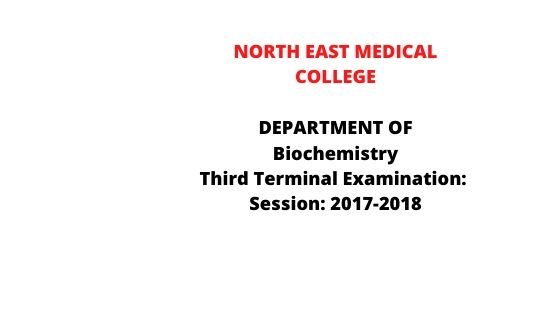
questions biochemistry mcqs
Session: 2016-2017
Group: A
- Shortly discuss the organization of DNA into chromosome. Draw and label the cell cycle with the function of each phase.
- Enumerate the salient features of replication with requirements. Draw and label replication fork.
- Define cellular communication. Enumerate different types of cellular communication with examples.
- What is recombinant DNA technology? Describe its steps and importance.
- Discuss the biosynthesis of thyroid hormones. Mention the function of aldosterone and cortisol in short.
- Name adrenocortical hormones. Discuss the mechanism of action of steroid hormones?
- How parathormone regulates plasma Ca2+ level? What is tetany?
- Draw and label the structure of insulin. How insulin is synthesized?
- Name the hormone that acts on the kidney. Write down the function of ADH and oxytocin.
questions biochemistry mcqs
Group: B
- Discuss in brief how quality control of a laboratory can be done. What is precision and accuracy?
- Define diabetes mellitus. Write down the clinical and biochemical findings in a patient presenting with DM.
- Mention the name of live function tests done in the laboratory. What are the biochemical differences between hemolytic, hepatocellular and obstructive jaundice?
- Give the account of the renal function test. Briefly discuss about uremia.
- What are the thyroid function tests? Mention the interpretation of results in hypothyroidism and hyperthyroidism.
- State the enzymatic tests related to myocardial disease with their significance. What are the components of the lipid profile?
- What are the modern techniques in biochemistry? Mention the principle and function of any two.
- Shortly discuss about HbA1c. mention the consequences of insulin deficiency.
- Write down the lists of preanalytical errors. Mention common lab hazards of a biochemistry lab.
questions biochemistry mcqs
Session 2017-2018
GROUP-A
1. Define Mutation. What are the types of mutation of point mutation with examples?
2. Mention the different phases of the cell cycle. What are the causes of DNA damages? Write down the different DNA repair process.
3. Define central dogma of life? Mention the requirements of replication. What are the difference between replication and transcription?
4. What do you mean by recombinant DNA technology? Mention its uses. What are the process of amplification of fragment of DNA?
5. Define gene and genome. Mention the characteristics of genetic code. Explain about wobble phenomenon and its importance.
6. Mention the types and functions of RNAs. Draw and level different arms of tRNA with the function of each arm.
7. Define translation. What are the requirements for translation? Shortly discuss about post translational modifications.
8. Write the mechanism of action of insulin. What are the consequences of deficiency of insulin?
9. Discuss about function of cortisol. Write down the clinical and biochemical features of cushing syndrome.
questions biochemistry mcqs
GROUP: B
1. Define photometry. State the basic principle of photometry. What is optical density?
2. Name the clinically important enzymes with their significance?
3. What is lipid profile? What are the components of lipid profile with their normal value? Which cholesterol is beneficial for body and which one is harmful, explain.
4. Define diabetes mellitus. Write down the clinical and biochemical findings in a patient presenting with diabetes mellitus.
5. Shortly discuss about proteinuria. Mention the consequence of hypoalbuminemia.
6. What are thyroid function tests? Interpret the results of primary, secondary and subclinical hypothyroidism. What is a goiter?
7. Mention renal function tests used in clinical practice. Explain different types of diuresis.
8. Mention common laboratory hazards and associated safety measures in clinical laboratory?
9. Mention major liver function tests with interpretation. Differentiate different types of jaundice biochemically.
Also read: Biochemistry Questions & Answers
Also read: Question Collection

Comments (0)